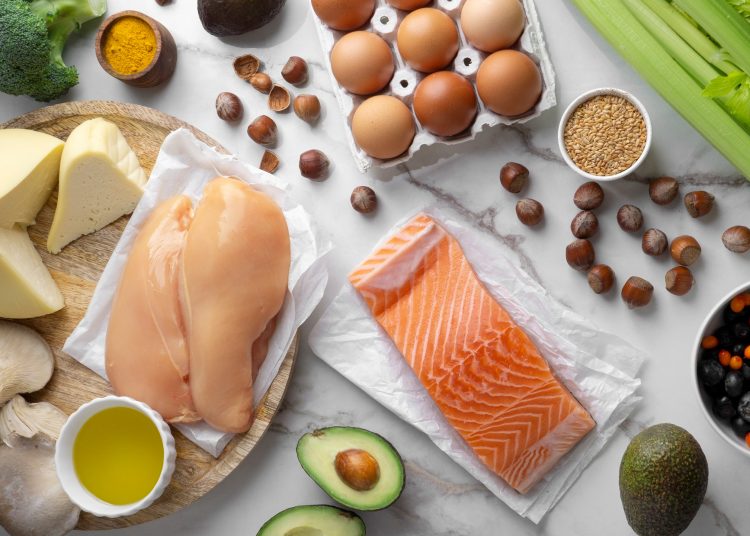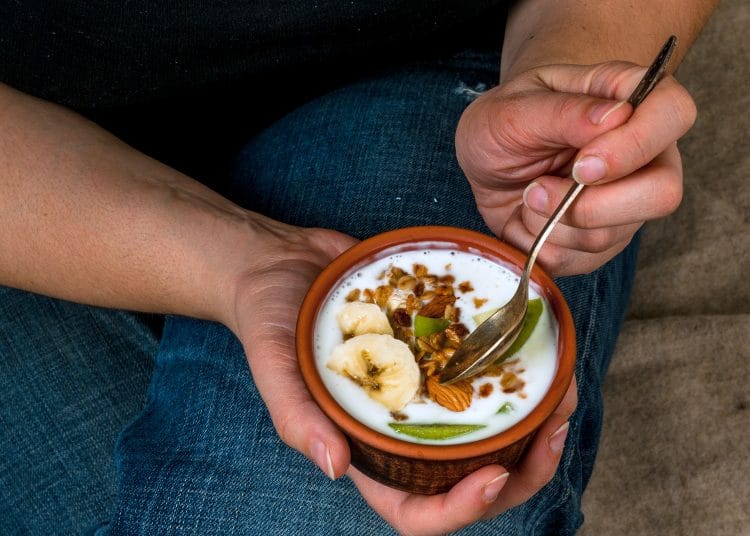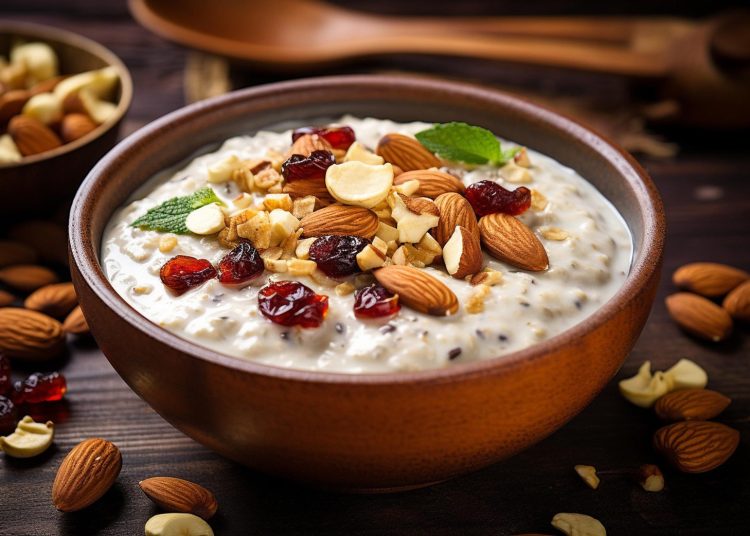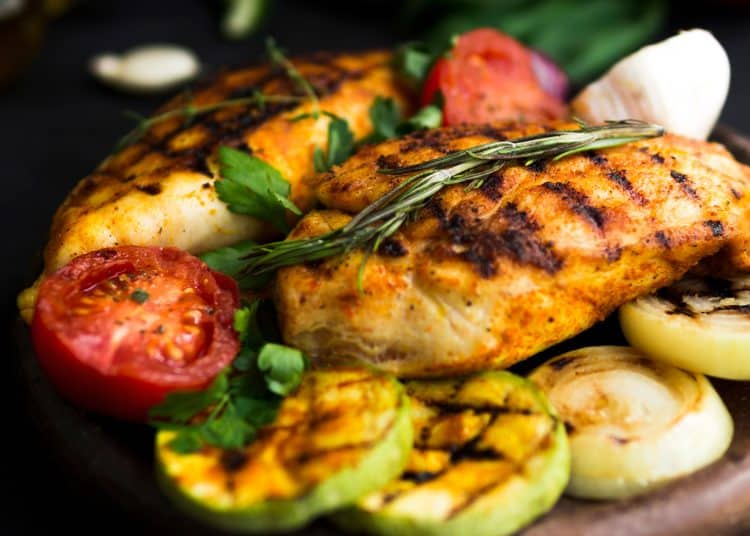Good nutrition and consistent exercise are two sides of the same coin. While paying attention to either of these things is beneficial, doing both can have a transformative effect on how you look, feel, and perform.
It’s like 1 + 1 = 5!
I’m a veteran personal trainer and nutrition coach and it’s my job to help people achieve their fitness goals. Because food and exercise are so closely connected, invariably I talk about both when I’m working with my clients. In most cases, pairing a good workout plan with a balanced diet produces better results than either could alone.
However, while I always do my best to practice what I preach, a busy work and home life mean that, sometimes, I forget to follow my own advice.
I recently started using an app to track my food intake and was surprised to learn that my protein intake was lower than it should be. Most research suggests active adults, especially those engaged in strength training, should consume 1.6 to 2.2 grams of protein per kilogram of body weight (1). My intake was closer to 1.4 grams per kilo.
Spurred on by this discovery, I made a commitment to increase my protein intake and hit at least the low end of the 1.6 to 2.2 grams per kilo scale.
In this article, I reveal my results from consuming protein at every meal for 21 days.
The Importance of Dietary Protein
There are three macronutrients:
- Carbohydrate
- Fat
- Protein
Of these three, it can be argued that protein is the most important. In fact, the word protein comes from the Greek proteios, meaning “primary” or “of first importance.” Protein can be found in a range of foods, including meat, fish, eggs, dairy, nuts, seeds, beans, and some plants.
Related: Our List Of 40 Great Protein-Packed Foods
Protein is made up of nutritional building blocks called amino acids. When we eat protein, it is digested and broken down into these amino acids and our bodies use them for a wide range of functions.
These functions include:
- Muscle growth and repair
- Enzyme production
- Hormone regulation
- Immune function support
- Neurotransmitter synthesis
- Energy production (when needed)
- Transport of molecules (e.g., hemoglobin for oxygen transport)
- Structural support (e.g., collagen for skin and connective tissues)
- Fluid balance regulation
Consuming too little protein can have an adverse effect on many aspects of your fitness and health. Not least, it can make it hard to build muscle and recover from exercise.
In addition, protein has been shown to be useful during weight loss diets (2). That’s because high-protein meals are very satiating, and eating protein produces a small but useful boost in metabolic rate.
Despite all these proven benefits, a lot of people (me included!) fail to consume enough of this critical macro. However, for me at least, that was all about to change!
My Three-Week Plan to Eat Protein at Every Meal
Eating enough protein is not always easy. That’s because protein foods are often hard to come by, especially when you eat “on the go.”
Need a snack? Most convenience foods are carb-based. Want a quick and easy meal? Again, most takeouts are built around carbs.
So, I knew from the outset of this challenge that I’d have to make some changes to my diet to ensure I ate protein at every meal. I’d have to prepare some meals in advance and pay more attention when shopping for groceries, so I always had plenty of high-protein foods available.
To make things easier, I created a one-week menu that I intended to repeat three times to make 21 days. This would take the guesswork out of my new diet and make meal-prepping much easier.
This is what I ate:
Day 1
- Breakfast: Greek yogurt with almonds, berries, and a scoop of whey protein.
- Lunch: Turkey and avocado wrap with mixed greens and hummus.
- Dinner: Grilled salmon with quinoa and steamed broccoli.
Day 2
- Breakfast: Overnight oats with milk, chia seeds, and peanut butter.
- Lunch: Chicken Caesar salad in a jar (chicken breast, romaine lettuce, parmesan cheese, and Caesar dressing).
- Dinner: Beef stir-fry with tofu, bell peppers, and brown rice.
Day 3
- Breakfast: Smoothie bowl with banana, spinach, almond milk, and protein powder topped with granola and nuts.
- Lunch: Tuna salad sandwich (canned tuna mixed with mayonnaise, chopped onions, and diced hard-boiled egg) on whole-grain bread.
- Dinner: Pork chops with roasted sweet potatoes and green beans.
Day 4
- Breakfast: Scrambled eggs with spinach and turkey bacon, served with whole-grain toast.
- Lunch: Chicken and quinoa bowl with roasted vegetables (carrots, zucchini) and a dollop of tzatziki sauce.
- Dinner: Shrimp and vegetable skewers with quinoa.
Day 5
- Breakfast: Cottage cheese with sliced peaches and a sprinkle of cinnamon.
- Lunch: Ham and cheese roll-ups with carrot sticks and hummus.
- Dinner: Grilled chicken breast with roasted Brussels sprouts and brown rice.
Day 6
- Breakfast: Avocado toast with poached eggs and cherry tomatoes on whole-grain bread.
- Lunch: Lentil soup with a side of whole-grain crackers and a hard-boiled egg.
- Dinner: Grilled steak with roasted asparagus and quinoa.
Day 7
- Breakfast: Protein pancakes made with protein powder, topped with Greek yogurt and berries.
- Lunch: Chicken and avocado salad (mixed greens, diced chicken, avocado, cherry tomatoes) in a container.
- Dinner: Baked cod with roasted cauliflower and brown rice.
Snacks
In addition, to double down on this challenge, I also included high-protein snacks in my diet. This would all but guarantee that I consumed enough protein for my activity levels and goals. I didn’t plan my snacks in advance and ate what was available, but some of my favorites included:
- Greek yogurt with nuts and seeds
- Cottage cheese with berries
- Hard-boiled eggs
- Beef jerky
- Protein bars (low sugar, high protein)
- Tuna packets
- Peanut butter on rice cakes
- Turkey roll-ups with sliced cheese
- Protein smoothies with whey protein
- Handful of mixed nuts (almonds, walnuts, cashews)
Related: Protein Calculator: Find Your Daily Protein Intake
The Results of Eating Protein at Every Meal for 21 Days
Apart from a couple of small slip-ups (pizza night!) I ate protein in every meal for three weeks. This ensured that my one 21-day experiment provided the best possible results:
Increased Muscle Growth and Strength
As my protein intake had been a little low of late, it was no surprise that raising it to the recommended level resulted in renewed muscle growth and increased strength. After all, this is the very reason that protein shakes are considered a must-have for bodybuilding.
While my gains were small – it was only three weeks, after all – any increases in strength or muscle mass are always welcome.
Improved Recovery from Exercise
The amino acids in protein are the building blocks of muscle tissue. Your body uses amino acids to repair your muscles after intense exercise. Consequently, too little protein can undermine your recovery.
Eating protein at every meal ensured that my muscles got more of what they needed, and I felt much more recovered between workouts. As a result, I was able to train harder which contributed to my increases in muscle mass and strength.
Enhanced Satiety and Reduced Cravings
Protein is a major gastric inhibitor, meaning it helps keep food in your stomach for longer. This helps keep you feeling fuller for longer. In addition, protein keeps your blood glucose levels stable, preventing cravings.
I experienced this protein superpower for myself and had no hunger and very few cravings during my three-week experiment.
Unexpected Fat Loss
While I didn’t lose any weight during my increased protein intake experiment, I did get noticeably leaner. This was due to eating less, as I didn’t feel hungry, and a boost in resting metabolic rate.
Protein has a high thermic effect, meaning eating and digesting it uses a significant amount of energy. While the TEF of my meals will have varied according to the ratio of protein, carbs, and fat they contained, eating protein certainly boosted my metabolism and burned off a little fat.
Stronger Immune Function
Despite being cold and flu season, I didn’t get so much as a sniffle during my three-week protein-at-every-meal experiment. According to research, not consuming enough protein can hurt your immunity (3). Therefore, it stands to reason that eating enough will enhance the ability to ward off harmful pathogens and keep you healthy.
More Stable Energy Levels
Eating more protein helped stabilize my energy levels. I usually experience a mid-afternoon slump after my standard high-carb lunch and often feel sleepy after dinner. I experienced no such issues during this three-week experiment and felt more awake and productive as a result.
Enhanced Cognitive Function and Focus
It wasn’t only my physical energy that seemed more stable, but my mental energy, too. I was more focused and felt sharper—like I had recently drunk coffee but without the jitters. Name and number recall, something I often struggle with, felt easier and I was more creative, too.
While this was news to me, research indicates that there is a strong link between protein intake and cognitive health (4).
So, more protein for bigger biceps AND a bigger brain—who knew!?
Improved Skin and Nail Health
I’ve been shaving my head for decades, so I cannot claim that eating more protein is good for your hair! However, my nails were noticeably stronger, and my skin looked healthier and a little more youthful. This is probably why a lot of anti-aging skin care products contain collagen and other types of protein.
And a Couple of Downsides…
While the effects of including protein in every meal were largely positive, there were a couple of downsides, too.
Firstly, the amount of money I was spending on groceries jumped by a not-insignificant 30%. Carb foods like bread, rice, pasta, potatoes, etc. are cheap, whereas meat, fish, eggs, and so on are much more expensive.
I could have saved money by eating more plant-based protein sources but I’m not very familiar with cooking them, so I focused predominately on animal protein sources.
In addition, increasing my protein intake overnight had a noticeable effect on my digestion. For the first few days of my three-week experiment, I felt a little bloated and my stomach was unsettled. Thankfully, this unwanted side effect vanished partway through the first week.
Closing Thoughts
The best diet is usually the one you can stick to. That’s because, as soon as things become difficult or seem more trouble than they are worth, most people choose the easy option, often returning to previous bad habits.
Eating protein at every meal was actually quite easy, although it did require some planning and additional cost. That said, the results made the effort worthwhile and while I didn’t continue this experiment beyond the planned three weeks, I did continue to prioritize protein and hit my recommended intake more times than not.
Have you ever tried consuming protein at every meal? How did it affect you? Share your thoughts and experiences in the comments section below—I’d love to hear from you!
References:
1 – Stokes T, Hector AJ, Morton RW, McGlory C, Phillips SM. Recent Perspectives Regarding the Role of Dietary Protein for the Promotion of Muscle Hypertrophy with Resistance Exercise Training. Nutrients. 2018 Feb 7;10(2):180. doi: 10.3390/nu10020180. PMID: 29414855; PMCID: PMC5852756.
2 – Moon J, Koh G. Clinical Evidence and Mechanisms of High-Protein Diet-Induced Weight Loss. J Obes Metab Syndr. 2020 Sep 30;29(3):166-173. doi: 10.7570/jomes20028. PMID: 32699189; PMCID: PMC7539343.
3 – Institute of Medicine (US) Committee on Military Nutrition Research. Military Strategies for Sustainment of Nutrition and Immune Function in the Field. Washington (DC): National Academies Press (US); 1999. 1, A Review of the Role of Nutrition in Immune Function.
4 – Li Y, Li S, Wang W, Zhang D. Association between Dietary Protein Intake and Cognitive Function in Adults Aged 60 Years and Older. J Nutr Health Aging. 2020;24(2):223-229. doi: 10.1007/s12603-020-1317-4. PMID: 32003415.
Tip: If you're signed in to Google, tap Follow.















